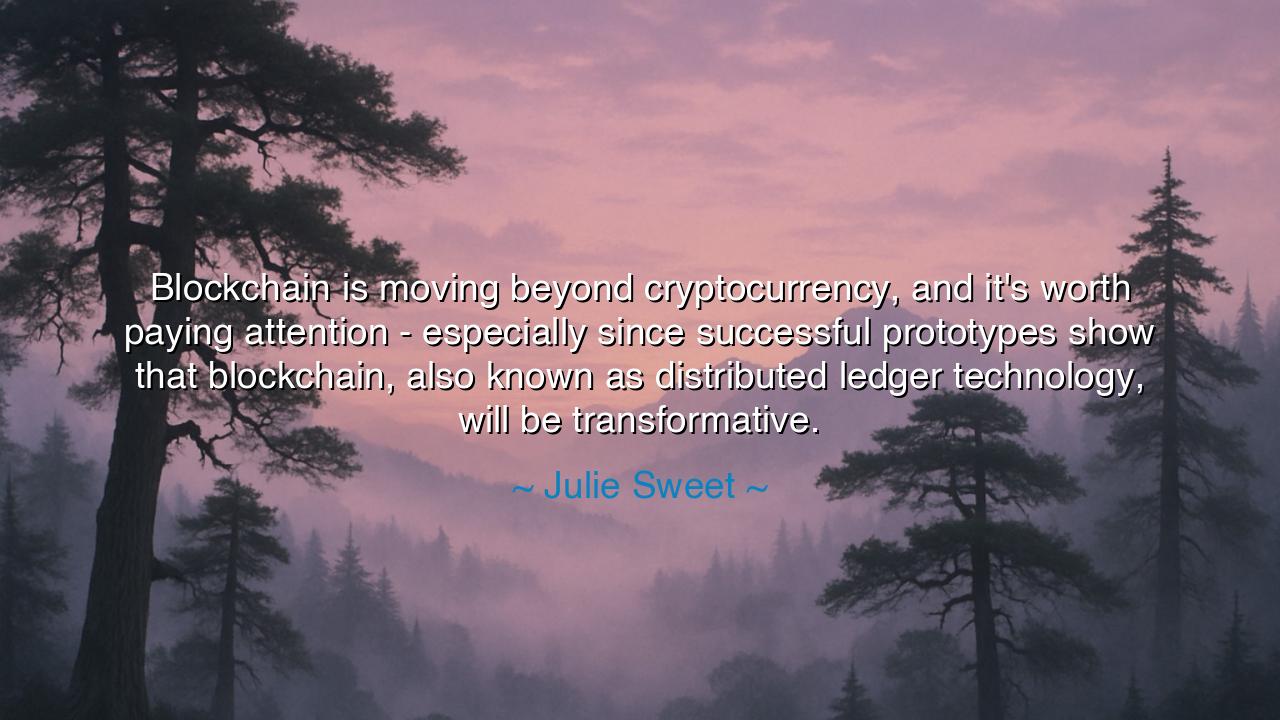
Blockchain is moving beyond cryptocurrency, and it's worth
Blockchain is moving beyond cryptocurrency, and it's worth paying attention - especially since successful prototypes show that blockchain, also known as distributed ledger technology, will be transformative.






Julie Sweet, leader of vision and strategy, spoke with the voice of foresight when she declared: “Blockchain is moving beyond cryptocurrency, and it’s worth paying attention — especially since successful prototypes show that blockchain, also known as distributed ledger technology, will be transformative.” These words are not merely about finance or code, but about the birth of a force that may alter the very structure of trust, exchange, and record in human society. She names blockchain not as a passing novelty, but as a foundation stone for the future, a current of change flowing quietly yet powerfully beneath the surface of our age.
In its beginning, blockchain was known to the world through cryptocurrency, through coins of light that challenged the dominance of banks and nations. Yet Sweet’s wisdom reminds us that the true power of this technology lies deeper. It is not the coin that matters, but the chain — the unbreakable ledger, open and incorruptible, that can secure truth against the decay of lies. In this, blockchain touches upon one of the oldest struggles of humankind: how to build trust among strangers, how to record truth without distortion, how to ensure fairness in the exchanges that bind societies together.
History has long wrestled with this problem. In ancient Mesopotamia, clay tablets were pressed with cuneiform to record debts, trades, and laws, for men needed a way to hold memory beyond the frailty of speech. Later, in medieval Europe, ledgers were inked in monasteries and merchant halls, guarded by scribes whose honesty was never certain. Even in the modern age, corruption, error, and deceit have haunted the keeping of records. But with blockchain, Sweet proclaims, a new possibility arises: a ledger not kept by one, but by many, distributed across the globe, impervious to tampering. Here lies the seed of transformation.
Consider the tale of the Florentine bankers of the Renaissance, who forged prosperity by creating systems of credit and exchange across nations. Their ledgers held the lifeblood of commerce, yet with them also came the dangers of fraud, favoritism, and collapse. If they had possessed a tool like blockchain — incorruptible, transparent, shared — the risks of deceit and ruin might have been lessened. Sweet’s words remind us that our age has given birth to something the ancients longed for: a record that cannot be twisted by human greed.
But she also warns us to pay attention. For every great invention carries both promise and peril. Blockchain may indeed bring fairness, speed, and clarity to commerce, governance, and even daily life. Yet if ignored, it may also concentrate power in the hands of those who seize it first, shaping the world in their own image. To “pay attention” is to be vigilant, to learn, to understand, and to act with wisdom before the path is chosen by others. Transformation does not wait; it is already upon us, and we must decide how it will serve humanity.
The meaning of her words is thus: blockchain is not merely about wealth, but about trust. It is not only a tool of markets, but of societies. It can secure votes in elections, ensure justice in supply chains, and create systems where truth cannot be hidden. It is a revolution not of guns or banners, but of records and agreements. Those who dismiss it as mere speculation fail to see the deeper tide that is rising.
Therefore, let the listener act with foresight. Study this technology, for to be ignorant of it is to be left behind. Ask not only how it can enrich you, but how it can serve the common good. Support systems that use it for justice, for transparency, for empowerment of the many rather than control by the few. For as Julie Sweet has declared, blockchain will indeed be transformative — the question is whether it will transform us toward fairness and light, or toward deeper chains of control. The choice, as always, belongs to those who dare to understand and act.






AAdministratorAdministrator
Welcome, honored guests. Please leave a comment, we will respond soon